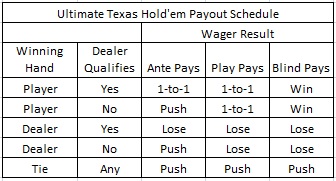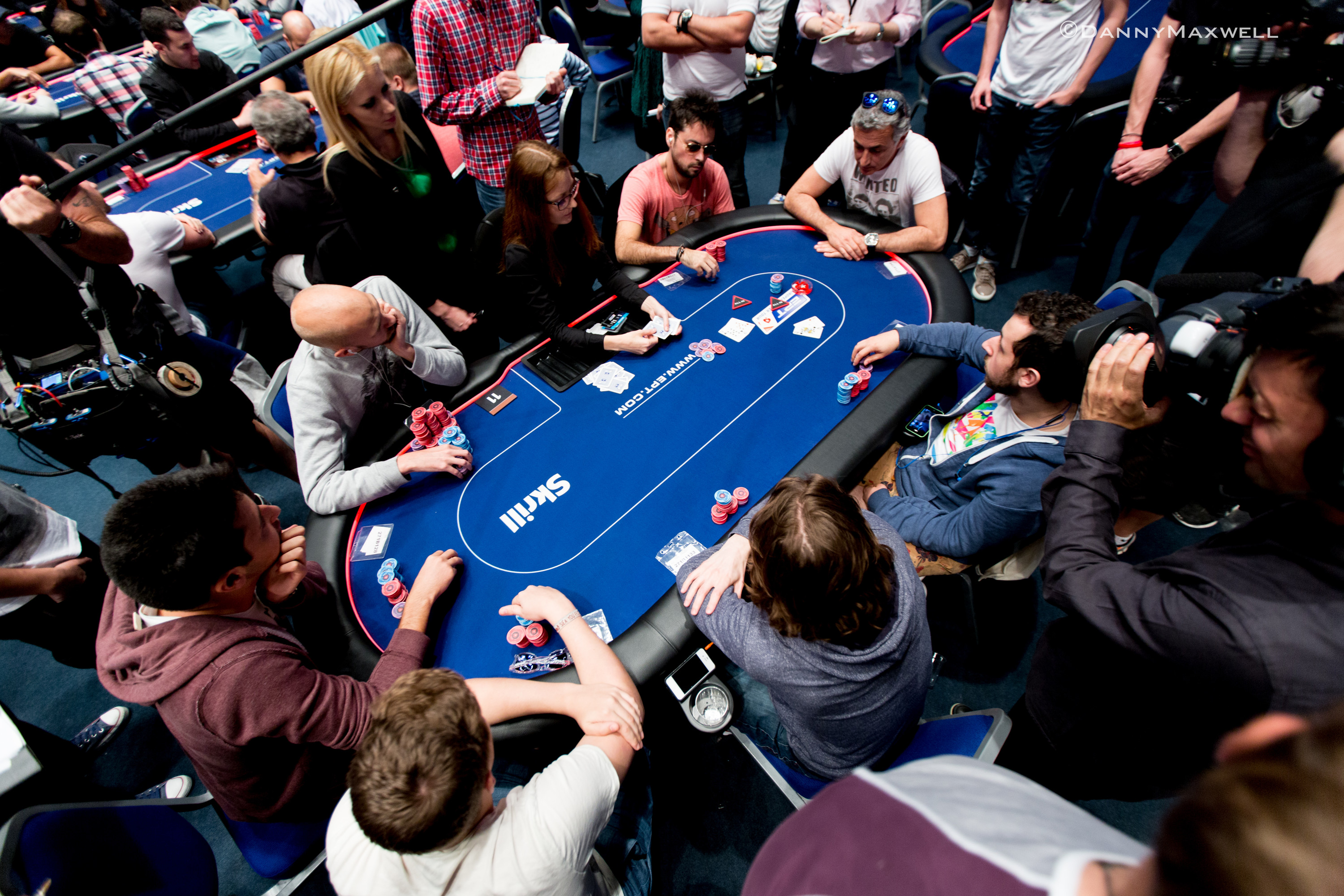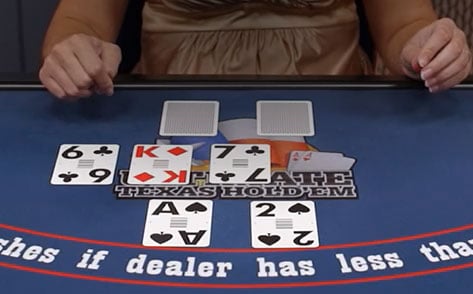- Ultimate Texas Holdem Advanced Strategy Guide Pdf
- Ultimate Texas Hold'em Advanced Strategy
- Ultimate Texas Holdem Strategy Printable
- Ultimate Texas Holdem Chart
- There's a particular strategy you can follow if you want to win Ultimate Texas Hold'em. You always make a large raise (4x), when you have an Ace. On the other hand, when you have a King, you only make a raise with 2, 3, and 4 when it is suited. With a Queen, you never make a raise with 2, 3, 4, and 5 and rarely with 6 and 7.
- Ultimate Texas Hold'em is a variation of Texas Hold'em, designed for those who like to play against the house. Its inventor is Roger Snow, a founder of the popular Internet portal ShuffleMaster. We are going to remind you that the gameplay has the following steps: The client makes two equal bets (ante and blind).
There's a particular strategy you can follow if you want to win Ultimate Texas Hold'em. You always make a large raise (4x), when you have an Ace. On the other hand, when you have a King, you only make a raise with 2, 3, and 4 when it is suited. With a Queen, you never make a raise with 2, 3, 4, and 5 and rarely with 6 and 7. Watch More Content Here!! Twitch: -Discord: (Require to Play Blackjack with us on Tw.

Just a few months ago, I wrote about how I thought Ultimate Texas Hold'em has the perfect betting structure. This past Saturday night, I had an opportunity to see this in action.
My wife and I attended the new variety show at Wynn called Showstoppers. I definitely recommend it, but would suggest looking for discount tickets!
After the show, we stopped to watch an Ultimate Texas Hold'em table game in action. It was a $15 table, which is not for the faint of heart. You have to be ready to wager $75-$100 per hand, including the Ante, Blind, Trips and Play wagers.
In one hand, I saw everything that makes this game the blockbuster it is. First there was a player who had a marginal 4x hand. He had a King-8 offsuit. The player will win this hand about 54% of the time and lose about 42.5%.
The player clearly did not have a strong grasp of the game or the rules. After seeing his first two cards, he attempted to make a play wager that was only 1x his Ante. I don't know how you sit down with hundreds of dollars at risk and have little idea of the strategy and knowledge of the basics of the game!
The dealer told the player he could not bet 1x at this point. He asked the player to show him the cards. Upon seeing the K-8, the dealer said this hand was worth the wager, but only 3x and not 4x!
At this point, I was ready to smack my head against the table (or maybe the dealer's). There is no hand in UTH that would make you want to bet 3x instead of 4x. Being able to bet 4x is an advantage to the player. By betting only 3x, you're giving some of this back to the house.
While there are some hands betting 3x is better than waiting for the flop, there are none you are better off betting 3x over 4x. The right play was to bet 4x and this player cost himself some potential payback.
Lesson No. 1:Don't listen to the Dealers.
I'm sure many are knowledgeable at some basic games like Blackjack or games that have simple strategy like Three Card Poker. But why would you think the dealer knows the strategy for UTH?
I developed the only known strategy for the game. I haven't had a chance to yet complete my booklet, so the likelihood the dealer really knows the right strategy is very slim.
Lesson No. 2:Know the rules of the game you are playing.
I didn't notice if the table had instruction cards for the game, but here in Las Vegas, the tables frequently do. Read them before you play.
The story doesn't end there. From what I've told you so far, it would explain why the game holds so much for the casino, but it doesn't necessarily explain why the game is so popular despite holding so well for the casino. We have to move to our second player for that. He had an even stronger hand. A-10 offsuit.
Again, not a massive hand, but this one will win 59% of the time vs. losing 38%. I watched as he chose not to make a 4x wager at all. I guess only a pair of bullets will do. The flop came – J-5-3. No real help.
He decided to make a 2x wager shaking his head, as if he wasn't too happy about doing it. He had the top card. There was little chance of a Straight or Flush on the board. The hand still wasn't great, but not bad.
Along comes the turn and the river. The 5 paired up and an 8. He shook his head further. I didn't understand why. Sure, he didn't pull an Ace or a 10, but still had the top kicker. The dealer had now automatically qualified because the board had a pair. Realistically, there were 11 outs for the dealer, who would need a J, 8, 5 or 3 to beat the player.
On a very rough calculation we can go with 11 outs times 2 Dealer Cards, which gives us 22 out of 45 remaining. The player was in a 50/50 position at this point, if we allow for pocket pairs. Again, not exactly where you want to be, but you could be doing a lot worse.
I don't remember the exact cards the dealer had, but I do know he didn't have a J, 8, 5 or 3 or a pocket pair. The player won $15 for the Ante and $30 on the Play. The Blind pushed. He won $45. He was as happy as can be!
At that very moment, my thoughts on UTH's betting structure were completely confirmed. The player made a wrong decision and cost himself money. He should have had $75, but won only $45. He was happy as a clam.
A few months ago, I likened this to a player playing blackjack who doesn't double down when he should and is still happy he wins the hand for $10 instead of $20. The only difference is in blackjack an opportunity to double down occurs about 5-10% of the time.
In UTH, the opportunity to bet 4x occurs around 50% of the time.
This means if you chicken out of all but the top hands, you'll be doing the wrong thing 25-40% of the time. This is going to cost you big bucks over time.
The ultimate irony is that you'll probably be as happy as can be while doing it!
Buy his book now!
Elliot Frome is a second generation gaming analyst and author. His math credits include Ultimate Texas Hold'em, Mississippi Stud, House Money and many other games. His website is www.gambatria.com. Contact Elliot at [email protected].
Become a VIP today and get exclusive tips just like this and free daily picks!
There are 3 decision points during the game of Ultimate Texas Hold 'Em: Pre-flop, the

PRE-FLOP

Just a few months ago, I wrote about how I thought Ultimate Texas Hold'em has the perfect betting structure. This past Saturday night, I had an opportunity to see this in action.
My wife and I attended the new variety show at Wynn called Showstoppers. I definitely recommend it, but would suggest looking for discount tickets!
After the show, we stopped to watch an Ultimate Texas Hold'em table game in action. It was a $15 table, which is not for the faint of heart. You have to be ready to wager $75-$100 per hand, including the Ante, Blind, Trips and Play wagers.
In one hand, I saw everything that makes this game the blockbuster it is. First there was a player who had a marginal 4x hand. He had a King-8 offsuit. The player will win this hand about 54% of the time and lose about 42.5%.
The player clearly did not have a strong grasp of the game or the rules. After seeing his first two cards, he attempted to make a play wager that was only 1x his Ante. I don't know how you sit down with hundreds of dollars at risk and have little idea of the strategy and knowledge of the basics of the game!
The dealer told the player he could not bet 1x at this point. He asked the player to show him the cards. Upon seeing the K-8, the dealer said this hand was worth the wager, but only 3x and not 4x!
At this point, I was ready to smack my head against the table (or maybe the dealer's). There is no hand in UTH that would make you want to bet 3x instead of 4x. Being able to bet 4x is an advantage to the player. By betting only 3x, you're giving some of this back to the house.
While there are some hands betting 3x is better than waiting for the flop, there are none you are better off betting 3x over 4x. The right play was to bet 4x and this player cost himself some potential payback.
Lesson No. 1:Don't listen to the Dealers.
I'm sure many are knowledgeable at some basic games like Blackjack or games that have simple strategy like Three Card Poker. But why would you think the dealer knows the strategy for UTH?
I developed the only known strategy for the game. I haven't had a chance to yet complete my booklet, so the likelihood the dealer really knows the right strategy is very slim.
Lesson No. 2:Know the rules of the game you are playing.
I didn't notice if the table had instruction cards for the game, but here in Las Vegas, the tables frequently do. Read them before you play.
The story doesn't end there. From what I've told you so far, it would explain why the game holds so much for the casino, but it doesn't necessarily explain why the game is so popular despite holding so well for the casino. We have to move to our second player for that. He had an even stronger hand. A-10 offsuit.
Again, not a massive hand, but this one will win 59% of the time vs. losing 38%. I watched as he chose not to make a 4x wager at all. I guess only a pair of bullets will do. The flop came – J-5-3. No real help.
He decided to make a 2x wager shaking his head, as if he wasn't too happy about doing it. He had the top card. There was little chance of a Straight or Flush on the board. The hand still wasn't great, but not bad.
Along comes the turn and the river. The 5 paired up and an 8. He shook his head further. I didn't understand why. Sure, he didn't pull an Ace or a 10, but still had the top kicker. The dealer had now automatically qualified because the board had a pair. Realistically, there were 11 outs for the dealer, who would need a J, 8, 5 or 3 to beat the player.
On a very rough calculation we can go with 11 outs times 2 Dealer Cards, which gives us 22 out of 45 remaining. The player was in a 50/50 position at this point, if we allow for pocket pairs. Again, not exactly where you want to be, but you could be doing a lot worse.
I don't remember the exact cards the dealer had, but I do know he didn't have a J, 8, 5 or 3 or a pocket pair. The player won $15 for the Ante and $30 on the Play. The Blind pushed. He won $45. He was as happy as can be!
At that very moment, my thoughts on UTH's betting structure were completely confirmed. The player made a wrong decision and cost himself money. He should have had $75, but won only $45. He was happy as a clam.
A few months ago, I likened this to a player playing blackjack who doesn't double down when he should and is still happy he wins the hand for $10 instead of $20. The only difference is in blackjack an opportunity to double down occurs about 5-10% of the time.
In UTH, the opportunity to bet 4x occurs around 50% of the time.
This means if you chicken out of all but the top hands, you'll be doing the wrong thing 25-40% of the time. This is going to cost you big bucks over time.
The ultimate irony is that you'll probably be as happy as can be while doing it!
Buy his book now!
Elliot Frome is a second generation gaming analyst and author. His math credits include Ultimate Texas Hold'em, Mississippi Stud, House Money and many other games. His website is www.gambatria.com. Contact Elliot at [email protected].
Become a VIP today and get exclusive tips just like this and free daily picks!
There are 3 decision points during the game of Ultimate Texas Hold 'Em: Pre-flop, the Turn, & the Showdown. Below is the perfect strategy for the Pre-flop decision and a simplified strategy for the Turn & Showdown. For the optimal strategy, I have found Stephen How's Ultimate Texas Hold 'Em strategy to be the most comprehensive. He has great coverage of the game on his site, Discount Gambling. The advice used in this game is modeled after his strategy.PRE-FLOP (first decision):
When raising, always make a 4x raise. The player should never make a 3x raise.
Ultimate Texas Holdem Advanced Strategy Guide Pdf
| Your Hand | Strategy |
|---|---|
| Pair of 3's or better | raise |
| Ace + Any | raise |
| Suited King + Any | raise |
| Suited Q6 or better | raise |
| Suited J8 or better | raise |
| Unsuited K5 or better | raise |
| Unsuited Q8 or better | raise |
| Unsuited JT or better | raise |
| All others | check |
TURN (second decision):
| Your Hand | Strategy |
|---|---|
| No Pair | always check |
| One Pair | raise if pair uses one of your cards. check if pair is on the board (community cards). |
| Two Pair | always raise |
| Trips | raise if the trips uses one of your cards. check if trips is on the board (community cards). |
| All hands greater than Trips | always raise |
Ultimate Texas Hold'em Advanced Strategy
SHOWDOWN (last decision):Ultimate Texas Holdem Strategy Printable
| Situation | Strategy |
|---|---|
| Your hand is better than Trips | always raise |
| You have Trips | raise if the trips uses one of your cards or your lowest kicker is a 9. Otherwise, fold |
| You have Two Pair | raise if your 5-card hand is better than the board's 5-card hand, Raise if your kicker is a jack or better. Otherwise, fold |
| You have a Pair | raise if pair uses one of your cards or you have at least a Jack. Otherwise, fold |
| Scare Board and you have less than a pair | always fold |
| The board is unpaired | raise if you have 2nd nut kicker. Otherwise, fold |
| The board is paired | raise if you have 3rd nut kicker. Otherwise, fold |

